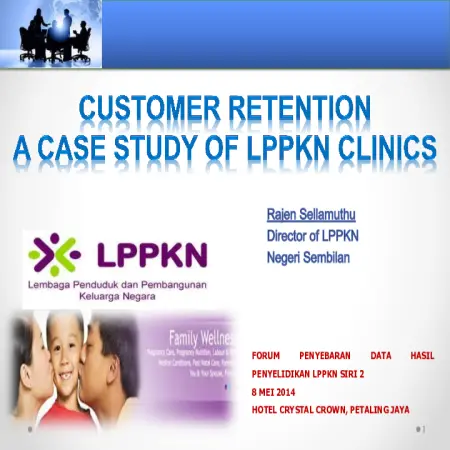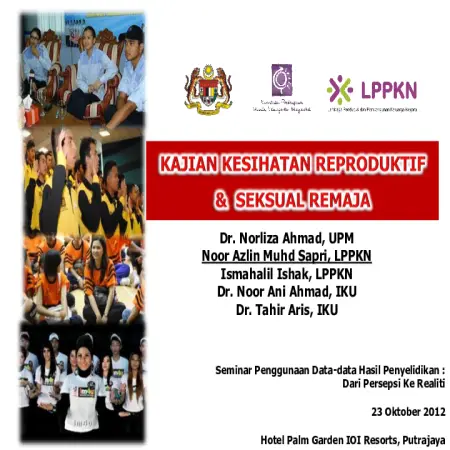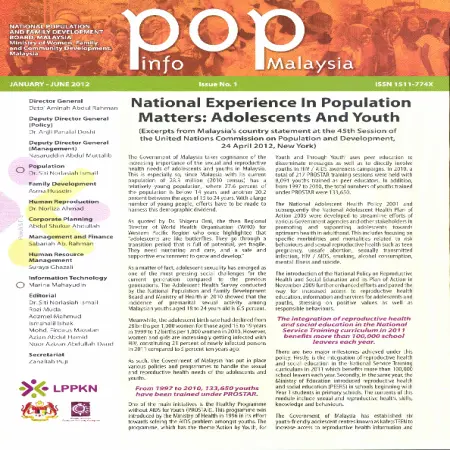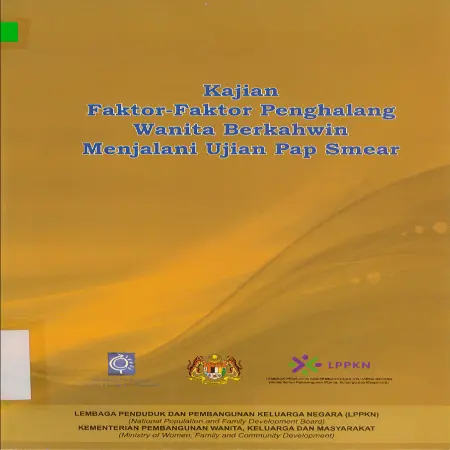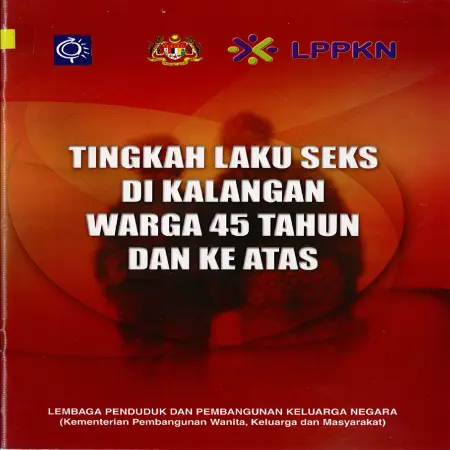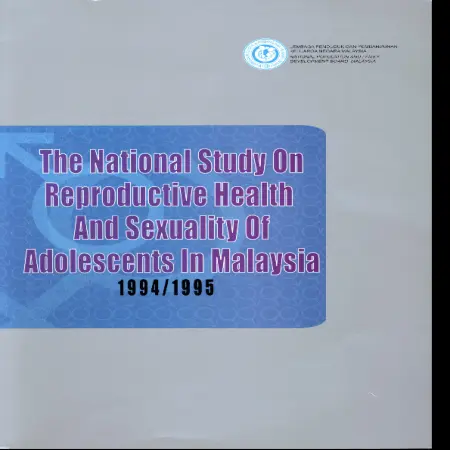TOPICS
Results for Topics : "Reproductive Health"
|
|
Customer retention: a case study of LPPKN clinical services
Item Type: Conference or Workshop Item
Editor:
Year: 00/00/2014
Abstract: This is a descriptive study intended to identify the main factors which contribute to the customer retention among the “Clinical Clients” of National Population and Family Development Board or LPPKN. The study focused on three variables to check on the level of influence, affect and effect to the process of customer retention. Those variables are service branding, perceived value and service quality. The study also covered the impact and influence of the demographic element to the service branding, perceived value and service quality in the process of customer retention. This study was conducted at the LPPKN Clinics in Klang Valley and Seremban. Understanding and fulfilling the customers need will contribute to retaining existing customers and reduce the customer switching intentions. The research findings show there is a positive relationship between perceived value and service quality with customer retention. Nevertheless relationship between service branding and customer retention is not supported for the LPPKN clinical setting. Analysis on the demographic factor showed that, it has a significant influence in regard to service branding, perceived value, services quality and customer retention. The output of the study will be helpful to managers and marketers of the clinical service to understand the customer needs, priority and expectations. Furthermore the findings of the research will enable the managers and policy makers to take necessary actions in their marketing and operational planning to stay competitive and maintain a stable income for a long term. This study will also help LPPKN Clinics to improve service quality, increase number of clinical clients, facilitate the process of customer retention and in long term improve financial performance.
|
|
|
|
|
|
Kajian kesihatan reproduktif & seksual remaja
Item Type: Conference or Workshop Item
Editor:
Year: 00/00/2012
Abstract: The increase in reproductive and social health issues among adolescents has been hotly debated both nationally and internationally. Every day, Malaysians are presented with news on adolescent misconduct, especially those involving cases of abortion and out -of -wedlock pregnancies. Therefore, a specific study to look at the level of reproductive and sexual health of adolescents and the factors that influence it was conducted based on the results of the national level of adolescent health research. Methodology this cross -sectional study was conducted in 2010 using secondary data from the Adolescent Health Screening Form (BSSK/R/1/2008) which was filled by trainees of the National Service Training Program (NSTP) in 80 NSTP camps throughout the country. To achieve the objectives of the study, the analysis used is descriptive analysis, chi -square test and logistic regression using SPSS software. The parameters studied included socio-demographic characteristics (gender, age, ethnicity and level of education) and social characteristics (risky behavior, history of abuse, anti-social behavior, substance abuse, religion, and family relationships). While there are nine (9) SRH issues that were studied, namely masturbation, watching pornography, extramarital sex, multi -partner sex, STIs, homosexual tendencies, homosexual relationships, pregnancy and abortion. Results A total of 23,231 data were analyzed. Of these, a total of 22,750 respondents aged 18-24 years were screened for the purpose of study analysis. The results of the analysis showed that the issue of watching and reading pornographic material among adolescents recorded the highest percentage (39.5%) followed by masturbation (28.5%) and extramarital sex (6.5%). All socio -demographic factors studied had a significant relationship with extramarital sex, homosexual predisposition and abortion (p <0.05). Risk factors for extramarital sex are the age group of 20-24 years (OR = 2.710, SK95% 1.967, 3.759), risky behavior (OR = 30.495 SK95% 19.683, 47.427), involvement in substance abuse (OR = 12.33 SK95% 8,051, 18,891), anti-social (OR = 2,615 SK95% 2,206, 3,100) and ever abused (OR = 1,726 SK95% 1,389, 2,145). While the appreciation of religion is a protective factor for adolescents where the study found that adolescents who appreciate religion are twice as likely to have sex compared to adolescents who do not appreciate religion. There is no evidence to suggest that familial relationship variables influence adolescents to have sex. Conclusion overall it can be concluded that adolescent reproductive and sexual health issues need to be given serious attention. This is because the results of the study show that the trend of extramarital sex among adolescents which is a key indicator of the level of adolescent reproductive and sexual health issues has increased from 2.2% in 2004 (MPFS-4) to 6.5% in 2010. Therefore, multisectoral cooperation programs are needed to address this issue. The implementation of intervention programs should also be focused on high-risk adolescents such as having risky behaviors, anti-social and involved in cases of substance abuse. The planning and preparation of the program must also take into account the concepts and teachings of religion practiced in Malaysia through an approach that can be accepted by adolescents. Further studies need to be conducted more extensively taking into account other factors that have yet to be explored.
|
|
|
|
|
|
National experience in population matters: adolescents and youth
Item Type: Newsletter
Editor:
Year: 00/00/2012
Abstract: Adequate and accurate sexual and reproductive health information helps young people to make informed and responsible decisions. Howewer, cultural and religious sensitivities within the communities remain one of the major challenges in implementing reproductive health education for young people. Parents are still uncomfortable talking about reproductive health matters with their children ,leaving their children dependent upon information from their peers or other sources like the internet. The Government of Malaysia takes cognisance of the increasing importance of the sexual and reproductive health needs of adolescents and youth in Malaysia. Hence, the Government of Malaysia has put in place various policies and programmes to handle the sexual and reproductive health needs of the adolescents and youths. One of the main initiatives is the Healthy Programme without AIDS for Youth (PROSTAR). The Government of Malaysia also has established six youth-friendly adolescent centres known as kafe@TEEN to increase access to reproductive health information and services for young people aged 13 to 24 years.
|
|
|
|
|
|
Cytotoxicity and expression profiles of apoptosis gene related in human cervical cancer (HeLa) cell lines in response to Newcastle disease virus (NDV) strains AF2240 And V4-UPM
Item Type: Thesis
Editor:
Year: 01/01/2011
Abstract: In this study the cytotoxicity and expression profiles of apoptosis gene related in human cervical cancer (HeLa) cell lines in response to Newcastle disease virus (NDV) strains AF2240 and V4-UPM were studied. NDV is a strain of avian paramyxovirus. NDV has been classified into the order Mononegavirales, family Paramyxoviridae, subfamily Paramyxovirinae and genus Rubulavirus. NDV caused severe economic losses in the poultry industry worldwide. Several local strains of Newcastle disease virus were reported to induce cytolysis to the cancerous cell lines. Strain AF2240 is a heat resistant viscerotropic velogenic NDV and strain V4-UPM is a heat resistant lentogenic which has significant higher thermostabilities of infectivity and haemagglutination were reported cytolysis leukemic cells in vitro and has shown in vivo anti leukemic agents . In this study the cytotoxicity effects of strains of NDV AF2240 and V4-UPM towards HeLa cell were determined by using standard microtetrazolium assay (MTT). Cytotoxicity dose 50% (CD50) cells treated with different titre of NDV as haemagglutination units (HAU) as compared to the untreated cells was estimated at 72 hours post-infection. The CD50 values obtained were 0.95 HAU and 1.0 HAU for strains AF2240 and V4-UPM, respectively. No cytolytic effect was noted towards normal cells (3T3) was observed. Both strains were also observed to inhibit HeLa cell proliferation. Morphological observations also have been done under inverted light and fluorescence microscopes. Under the inverted light microscope, the HeLa cells treated with both strains showed apoptotic features such as cell shrinkage, cell blebbing and formation of apoptotic bodies. Morphological features of apoptosis were also observed by using the AO/PI staining method under the fluorescence microscope. The AO/PI staining demonstrated the occurrence of apoptosis which was characterised mainly by chromatin condensation, nuclear shrinkage and formation of apoptotic bodies. Evidently, both strains AF2240 and V4-UPM used in the study were found to induce cells towards apoptosis rather than necrosis. NDV strain AF2240 and strain V4-UPM was also caused genotoxic in HeLa cells after two hours treatment with CD10 and CD25 values by alkaline comet assay. Results showed that HeLa cells treated with NDV strains AF2240, V4-UPM and hydrogen peroxide gave different distribution of scores. The HeLa cells treated with hydrogen peroxide as a positive control gave more percentage at score 2, 3 and 4 for both cytotoxicity values compared to the HeLa cells treated with NDV for both strains. Observation in this study has proved the genotoxic potential of the NDV strains AF2240 and V4-UPM to induce DNA damage on HeLa cells as early as two hours following treatment at very low cytotoxicity dose (CD10 and CD25) values. Meanwhile, the cell cycle analyses of HeLa cells treated with local strains of NDV AF2240 or V4-UPM did not induce cell cycle arrest in any specific phase. Sub-G1 phase (apoptosis peak) was found in both treated cells with a very high percentage compared to untreated cells with a small percentage. The results indicate that, the percentages of apoptosis were significantly increased (p≤0.05) in the time-dependent manner in both NDV strains treated HeLa cells. The molecular mechanisms of apoptosis may depend on the NDV strain and cell type. Six apoptosis genes were selected in this study namely Casp8, TNF-α, Bcl2 and TRAIL which focused on extrinsic pathway of apoptosis, while the gene Bax was used as an indicator for intrinsic pathway triggered by cellular stress. Lastly Myc, oncogene was used as an indicator for cell growth. From this study, NDV strain AF2240 was identified as a highly induced death receptor pathway due to the upregulation of TNF gene and the downregulation of Bax gene. Whereas NDV strain V4-UPM triggered both pathways but through the extrinsic pathway due to the very high expression of the TNF gene. The TNF gene was highly expressed due to its location and function as a stimulator of the death receptor pathway. The Casp8 gene was activated and expressed in order to enter the execution-phase of cell death. The Bcl-2 gene was continuously observed because of its function as an apoptosis regulator. Surprisingly, no expression was detected by the TRAIL gene. NDV strain AF2240 was more effective than NDV strain V4-UPM as an apoptosis inducer. These gene expression results showed that the apoptosis occurred and lead to cell death.
|
|
|
|
|
|
Kajian Penilaian Modul Pendidikan Kesihatan Reproduktif dan Sosial (PKRS) dalam kalangan Pelatih PLKN
Item Type: Research Report
Editor:
Year: 00/00/2011
Abstract: Adolescents are the future leaders of the country and have a huge influence on the social, economic and political situation of the country. However, with the presence of various social problems that plague teenagers today, it is feared that it will affect their future which in turn is detrimental to the country. The Ministry of Women, Family and Community Development (MWFCD) has taken the initiative by developing the Reproductive and Social Health Education Policy and Action Plan (PKRS) which aims to produce individuals who are knowledgeable and have a positive attitude in the field of reproductive and social health. Under this PKRS program, the National Population and Family Development Board (NPFDB) is one (1) of the agencies that implement the program. In line with the implementation of this policy, the National Service Training Council has agreed with MWFCD's proposal for PKRS to be implemented in PLKN. Following that, NPFDB has implemented one (1) Pre and Post Test Study to trainees to assess the level of knowledge and perception on reproductive and social health before and after the teaching of this PKRS module is conducted. This study also aimed to examine the sexual and reproductive behaviors of trainees.
This study was conducted in 2011 in a cross section on PLKN Trainees aged 17 years and above in selected National Service Training Camps in Malaysia using independent random sampling. The total sample required was 1,038 people. The calculation of this sample size is based on an estimated 31,200 PLKN trainees who are required to attend training using Confidence Interval (95%), Margin of Error (1.5%) and Prevalence of Having Sex Out of Wedlock Among Adolescents (6.5%), (Naing L, 2006). Questionnaires were developed according to the needs and objectives of the study. One-third of the questions of this questionnaire were adapted from an international study, namely the Youth Risk Surveillance Survey, 2011 but adapted according to the objectives of the study and the culture of the community in Malaysia. The method of questionnaire administration was self administered. The scope of the questionnaire covers three (3) domains namely demographic information, knowledge and attitudes towards reproductive and social health as well as adolescent sexual behavior. A total of 1,300 pieces of assessment forms (pre and post -test) were distributed during the first teaching session of the module. Of that number, only 1,063 forms were received for analysis. After the initial analysis was conducted, it was found that there were some questions that were not fully answered by the respondents. Therefore, the data analysis will vary according to the number of participants who answered for each section. In total, a total of 1,063 respondents were successfully covered in 13 training camps nationwide.
The results of the descriptive analysis showed that the respondents consisted of 57.8% male adolescents and 42.2% female. The majority of respondents were aged between 17 to 19 years (95.6%) with a mean age of around 18 years. Based on the ethnic composition, 66.7% are Malays, 15.3% Chinese, 4.2% Indians and 13.8% are other ethnicities including Sabah and Sarawak Bumiputera. Most respondents have SPM education (95.6%) and are unmarried (99.6%).
The overall findings of the study can be summarized that the level of respondents' knowledge on reproductive and sexual health increased significantly (p <0.05) after undergoing the PKRS module with an increase in mean knowledge score of 7.04±2.2 (before undergoing the module) to 9.17±2.1. A total of 71.1% of respondents obtained a score of 9 out of 12 items (75.0%) and above after undergoing the module. There was a significant change in attitudes (p <0.05) on reproductive and social health after undergoing PKRS training. This indirectly shows that this PKRS module seeks to help respondents change their attitudes in a more positive direction.
A total of 10.4% of respondents admitted to having had sex. The mean age of having sex for the first time is about 15 years. 45.5 percent of them had sex with more than one partner. Only 2.1 percent admitted to being sexually attracted to the same sex with 18.2% of them admitting to having had same -sex sex.
|
|
|
|
|
|
Kajian faktor-faktor penghalang wanita berkahwin menjalani ujian pap smear
Item Type: Research Report
Editor:
Year: 00/00/2010
Abstract: Cervical cancer is the second most dangerous threat to women that not only lead to a loss of pregnancy, but can even be life threatening. 12.9 percent of all cancer deaths among women are also due to this cancer. Unfortunately, 80% of women who are first diagnosed with cervical cancer are already at serious stage and cannot be treated properly even though cervical cancer screening programs such as Pap Smear have existed since 1943. Statistics released by the Ministry of Health Malaysia through the 2003 National Cancer Registry Report showed, even after the implementation of the Pap Smear program, the incidence rate of cervical cancer has increased where in 1990 the incidence rate was 13.3 per 100,000 women compared to 19.7 per 100,000 women in 2003. This illustrates that the Pap Smear program in Malaysia is not comprehensive and not practiced by those who need it which is women who have started sexual activity.
Therefore, the National Population and Family Development Board (LPPKN) has conducted a study in relation to cervical cancer screening or Pap Smear test. This study aimed to provide information on sociodemographic characteristics and reproductive history, women’s awareness on pap screening tests, women’s risk perceptions of cervical cancer, women’s attitudes towards the importance of Pap Smear testing and prevalence of Pap Smear screening test practice. This cross -sectional study was conducted in the Klang Valley, Melaka, Perak and Terengganu using purposive sampling. The total sample was 1000 people. The study population consisted of once married women aged between 20-65 years. This includes married women, widows and widowers. The conditions for rejecting the sample are ineligible women, such as unmarried women, non-Malaysian citizens and women who have had cervical cancer.
The collection of research data is through interviews based on the text of the questionnaire provided. Respondents will be interviewed by interviewers who have been trained to obtain accurate information. To achieve the objectives of the study, the analysis used is descriptive analysis, chi-square test and t test. Therefore, based on the analysis that has been conducted, the prevalence of female Pap Smear test is 55.2 percent. Respondents showed a positive attitude when asked about the importance of Pap Smear test compared to other examinations, many of whom thought that this test was very important (92.7 percent). Only 4.2 percent considered the Pap Smear test not important and there were a few who could not provide certainty about its importance (3.1 percent). Not many can measure the risk they are facing to get cervical cancer as 377 (41.5 percent) people are unaware of the cancer risk they are facing. However, there were a total of 276 (30.4 percent) women who were confident that they were not at risk at all. Only 7.7 percent received a high risk of this cancer, moderate risk (5.6 percent) and low risk (14.9 percent).
|
|
|
|
|
|
A Study on health status of youth in Malaysia
Item Type: Research Report
Editor:
Year: 00/00/2010
Abstract: This study analyzed health screening of 22,840 youths, who were distributed equally by ethnicity and camp sessions. Based on the analysis, 21.6% of youths were underweight, 18.1% pre-obese and 10.3% obese, with 0.3% perceived having body image disorders. With regards to sexual and reproductive health issues, 39.6% admitted viewing pornographic materials, 28.5% practiced masturbation, 6.5% engaged in premarital sexual relationships, 5.5% had multiple partners and 1.6% had been involved in homosexual relationships. History of abortion was discovered by 0.5% of the respondents. Almost a quarter of the youths were smokers, while 8.7% had consumed alcohol and 1.4% admitted taking drugs. The study also revealed that 6.2% of respondents reported to have past involvement in bully and 14.1% in fight. About 7.1% of the respondents revealed they had been physically abused while 1.2% of them had been sexually abused. Mental health problems were noted in 27.5% of the youths, with depression in 9.8% of the youths, anxiety in 20.7% and suicidal ideation in 11.8%. Psycho-social problems such as substance use, antisocial behavior, physical/sexual abuse and mental health problems among youth are interrelated with common risk and protective factors. Management of psycho-social problems in youths should be holistic; looking into risk and protective factors. Programs and interventions should focus on strengthening of protective factors among youth such as family connectedness and religiosity.
|
|
|
|
|
|
Kajian Pendapat Remaja dan Isu Sosial : mencari penyelesaian
Item Type: Research Report
Editor:
Year: 00/00/2010
Abstract: Introduction of Reproductive and Social Health Education Policy and Action of Plan (PKRS) has been developed which aims to produce individuals who are knowledgeable and have a positive attitude in the field of reproductive and social health. Under the PKRS program, the National Population and Family Development Board (NPFDB) has been given the mandate as the main agency in implementing the program. One of the programs is the Life Skills Program for teenagers which uses two (2) modules, namely the Cakna Diri Module (I’m In Control) and the Kesejahteraan Hidup Module. The purpose of this module developed is to improve adolescents' skills in aspects of reproductive health in order to avoid high-risk behaviors that lead to several problems such as premarital pregnancies, sexually transmitted diseases and HIV. Therefore, an opinion poll was conducted to see the general view on social issues of adolescents, especially from the aspect of reproductive health and the implementation of the Life Skills Program for adolescents.
|
|
|
|
|
|
Tingkah laku seks di kalangan warga 45 tahun dan ke atas
Item Type: Research Report
Editor:
Year: 00/00/2006
Abstract: An opinion survey on 'Sexual Behavior Among Citizens 45 Years and Above' which was first conducted by the Human Reproduction Division (BRM) was conducted in the Klang Valley area from February to June 2003. The 'Convenience Sampling' sampling method was used where respondents who meet certain criteria fill in the questionnaire themselves. A total of 473 respondents consisting of 50.1% Malays, Indians (26.6%) and Chinese (23.3%) where men (53.5%) outnumber than women (46.5%). The majority of respondents comprised the age group of 50-59 years (41.25%). From the 220 female respondents, only 7.3% took hormone replacement therapy. The results of the study found that the importance and satisfaction of sex decreases with age where it is more pronounced among women than men. The frequency of sexual intercourse is performed in the range of 4-8 times a month (46.3%). Although only 16.7% of respondents had sex-related problems, 70.9% of them did not know the source of help and treatment for their problems. Among those who received treatment, 56.4% chose to seek modern treatment. 55.7% of respondents with sexual problems have at least one chronic disease. A total of 85.6% disagreed and looked for another partner as a way out of sex -related problems. Expectations for better sex in the future are still high at 69.1%. In conclusion, for middle-aged and above despite the declining importance of sexual intercourse, their right to access to knowledge and services related to sexual problems needs to be addressed immediately, especially by medical practitioners, especially the Human Reproduction Division and LPPKN in general. A systematic and ‘gender-sensitive’ approach can help overcome the problem of family institutional breakdown and problems related to incest.
|
|
|
|
|
|
The National Study on reproductive health and sexuality of adolescents in Malaysia 1994/1995
Item Type: Research Report
Editor:
Year: 00/00/1996
Abstract: The National Study on Reproductive Health and Sexuality of Adolescents in Malaysia was initiated with the aim of formulating a National Programme on Reproductive Health for Adolescents. The specific objectives of the study are:
i. to establish the status of the knowledge, attitude
and practice of adolescents with regard to sexual
and reproductive health,
ii. to identify the constraints that adolescents face in
seeking information and service relating to sexual
and reproductive health,
iii. to obtain the participation of adolescents in the
design and implementation of programmes and
activities for their own welfare.
The single most expected outcome of the Study on Reproductive Health and Sexuality of Adolescents in Malaysia is a Cabinet memorandum which will propose appropriate policy and programme changes for the promotion and maintenance of optimal reproductive health among Malaysian adolescents geared towards the year 2020. This Memorandum will serve as a vital national reference and benchmark for evaluating future trends and patterns. It will be the basis for the reorientation of values, attitudes and approaches for the management of sexuality and reproductive health of adolescents in the country.
|
|
|
|





